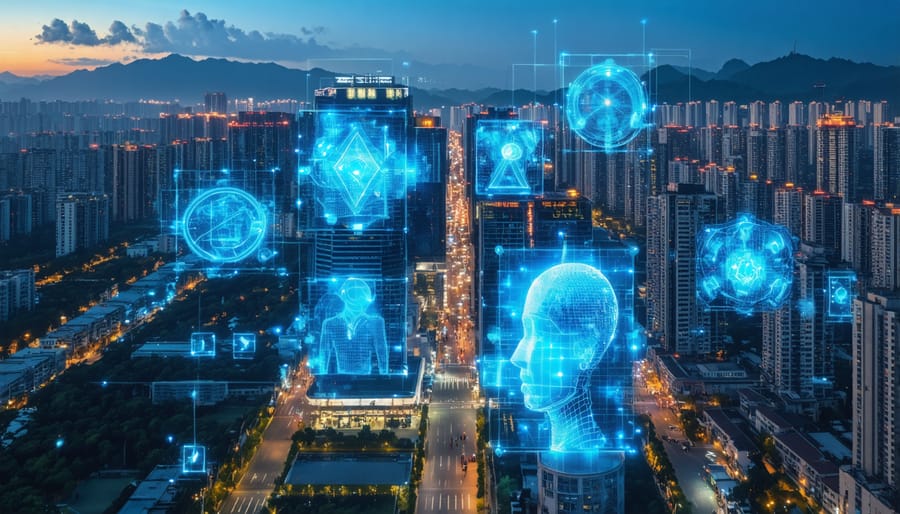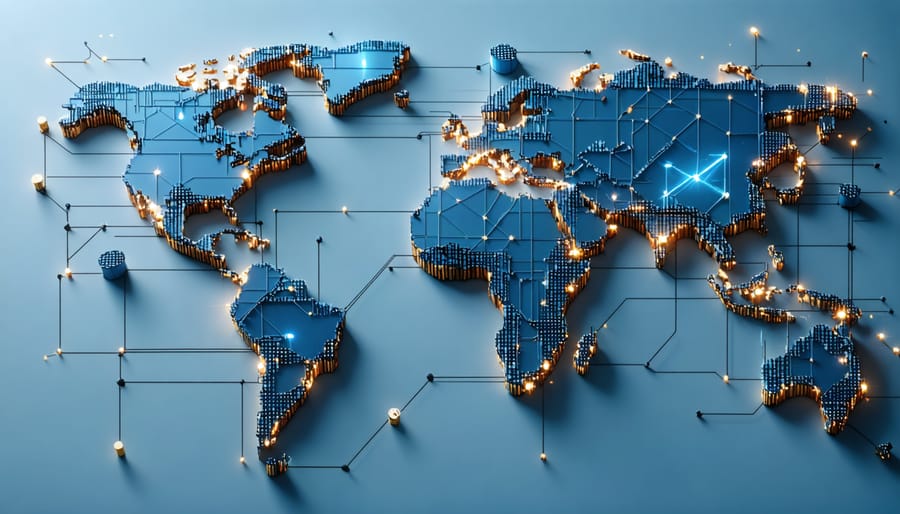The global artificial intelligence landscape has dramatically shifted beyond Silicon Valley’s borders, revealing a new world order where innovation knows no geographical bounds. From China’s meteoric rise in facial recognition technology to India’s AI-driven healthcare solutions, emerging powers are reshaping how we think about technological leadership. These AI breakthroughs aren’t just challenging Western dominance—they’re creating a rich tapestry of diverse approaches to artificial intelligence development.
Countries like South Korea, Israel, and the United Arab Emirates are investing billions in AI infrastructure, while nations across Africa are pioneering unique solutions in agriculture and financial technology. This global democratization of AI innovation isn’t just changing who leads technological advancement—it’s fundamentally altering what problems get solved and how solutions are implemented.
As we stand at this pivotal moment, understanding the contributions of non-Western nations isn’t just about acknowledging their achievements—it’s about recognizing how diverse perspectives and priorities are creating more inclusive, effective AI solutions for humanity’s most pressing challenges. The future of AI isn’t being written in any single country; it’s emerging from a worldwide collaboration of minds and methodologies.

China’s AI Revolution: Beyond the Great Firewall
Homegrown Giants: Baidu, Alibaba, and Tencent
China’s tech landscape is dominated by three giants collectively known as BAT – Baidu, Alibaba, and Tencent. These companies are actively reshaping our digital world through innovative AI applications and solutions.
Baidu, often called “China’s Google,” has made significant strides in autonomous driving technology through its Apollo platform and leads in natural language processing with its ERNIE model. The company’s smart speaker system, DuerOS, serves millions of Chinese households, demonstrating the practical integration of AI in daily life.
Alibaba’s cloud computing division has developed sophisticated AI tools for e-commerce, including image recognition systems that can process billions of product photos daily. Their City Brain project, which uses AI to optimize traffic flow in major cities, showcases how AI can solve real-world urban challenges.
Tencent, meanwhile, has leveraged its massive social media and gaming user base to develop AI applications in healthcare, facial recognition, and content recommendation systems. Their medical imaging AI has achieved remarkable accuracy in diagnosing common conditions, while their social media algorithms power personalized experiences for over a billion users.
These companies benefit from China’s vast data resources and supportive government policies, allowing them to rapidly develop and deploy AI solutions at scale. Their innovations are increasingly influential beyond China’s borders, offering unique perspectives on AI development and application.
China’s AI Infrastructure Advantage
China’s remarkable AI infrastructure advantage stems from three key factors: unprecedented data access, substantial government support for AI development, and robust technological capabilities. With a population of 1.4 billion people generating vast amounts of digital information daily, Chinese AI systems benefit from unparalleled training data volumes across various sectors.
The country’s technology ecosystem, anchored by giants like Baidu, Alibaba, and Tencent, has built sophisticated AI research facilities and computing centers. These companies leverage advanced hardware, including domestically produced chips and processors, to power their AI initiatives. The establishment of dedicated AI industrial parks in cities like Beijing, Shanghai, and Shenzhen has created innovation hubs that foster collaboration between researchers, startups, and established tech firms.
China’s advantage is further strengthened by its integrated digital infrastructure, where mobile payments, social media, and public services are seamlessly connected. This interconnected system provides rich, real-world data for AI training across multiple domains. The country’s ambitious plans include developing AI-specific semiconductors, expanding 5G networks, and building more powerful supercomputers to process complex AI algorithms.
Recent investments in quantum computing and edge AI technologies demonstrate China’s commitment to maintaining its infrastructural edge, while strategic partnerships between academic institutions and private companies ensure continuous innovation in AI development.
India’s Tech Transformation
Bangalore’s AI Startups
Bangalore, often dubbed India’s Silicon Valley, has emerged as a powerhouse in the AI startup ecosystem. The city hosts over 400 AI-focused startups, leveraging India’s vast talent pool and competitive advantages in software development. Companies like Artivatic AI and SigTuple are revolutionizing healthcare with AI-powered diagnostics, while Niramai has developed innovative thermal imaging solutions for early breast cancer detection.
The city’s success in AI innovation stems from its unique blend of technical expertise, entrepreneurial spirit, and strong support infrastructure. Leading technology institutes like IISc Bangalore and IIIT-B regularly produce skilled AI professionals, while incubators such as NASSCOM’s Center of Excellence for Data Science and AI provide crucial resources for emerging startups.
What sets Bangalore apart is its focus on solving distinctly Indian challenges through AI. Startups like CropIn use AI for agricultural optimization, helping farmers increase yields and manage resources efficiently. Meanwhile, companies like Niki.ai are developing vernacular language AI solutions to serve India’s diverse linguistic population.
The ecosystem benefits from substantial government support through initiatives like the Karnataka Innovation Authority and partnerships with global tech giants, fostering an environment where AI startups can thrive and scale internationally.
Healthcare AI Breakthroughs
India’s healthcare AI initiatives have revolutionized medical diagnostics and patient care, particularly in rural areas where access to specialists is limited. The country’s medical AI solutions combine advanced technology with cost-effective implementation, making healthcare more accessible to its vast population.
One notable breakthrough is the development of AI-powered tuberculosis screening tools that can analyze chest X-rays in seconds, helping address India’s high TB burden. These systems have been deployed in mobile medical units, reaching remote communities that previously had limited access to diagnostic services.
Indian researchers have also created AI algorithms that can detect diabetic retinopathy, a leading cause of blindness, with remarkable accuracy. This technology has been integrated into affordable screening devices, enabling early detection and treatment for millions of diabetes patients.
In the fight against COVID-19, Indian healthcare institutions developed AI models for predicting outbreak patterns and identifying high-risk patients. These systems helped optimize resource allocation during the pandemic’s peak, demonstrating the practical application of AI in crisis management.
The country’s focus on frugal innovation has resulted in AI solutions that are not only effective but also scalable and affordable, making them valuable for other developing nations facing similar healthcare challenges.

Israel: The Middle East’s AI Powerhouse
Israel has emerged as a significant force in the global AI landscape, earning its nickname as the “Startup Nation” with a particularly strong focus on artificial intelligence innovation. The country’s unique combination of academic excellence, military technology transfer, and entrepreneurial spirit has created a fertile ground for AI development.
Israeli AI startups are making waves across various sectors, with particular strength in cybersecurity, healthcare, and autonomous systems. Companies like Mobileye, which specializes in autonomous driving technology, have put Israel on the map as a leader in AI-powered transportation solutions. The company’s success story, including its $15.3 billion acquisition by Intel, demonstrates the caliber of innovation coming from this small but mighty nation.
The country’s AI ecosystem benefits from its highly skilled workforce, many of whom gain valuable experience in military intelligence units like the prestigious Unit 8200. This military-to-civilian technology transfer has created a unique advantage, as veterans apply their advanced technical knowledge to solve commercial challenges.
Tel Aviv, Jerusalem, and Haifa have become major AI hubs, hosting research centers for global tech giants including Google, Microsoft, and IBM. These centers collaborate with local universities, creating a powerful knowledge-sharing network that accelerates AI innovation.
Israeli AI companies are particularly noted for their practical applications in real-world scenarios. From agricultural drones using AI for crop optimization to medical imaging systems that detect diseases early, Israeli innovations are addressing critical global challenges.
The government actively supports this growth through initiatives like the Israel Innovation Authority, which provides funding and resources to AI startups. Universities like the Technion and Hebrew University have established specialized AI research centers, ensuring a steady pipeline of talent and breakthrough research.
What sets Israel apart is its focus on applied AI solutions rather than purely theoretical research. This practical approach, combined with a culture that embraces risk-taking and innovation, continues to strengthen Israel’s position as the Middle East’s AI powerhouse.
South Korea’s AI Renaissance
South Korea has emerged as a powerhouse in artificial intelligence, leveraging its technological infrastructure and cultural innovation to create unique AI applications. The country’s government-backed Digital New Deal initiative has committed over $13.8 billion to AI development, positioning South Korea as a frontrunner in the global AI race.
What sets South Korea apart is its distinctive approach to AI integration in everyday life. The nation has pioneered AI applications in areas like healthcare, where AI-powered diagnostic tools are being used in major hospitals to detect diseases earlier and with greater accuracy. Seoul’s smart city project showcases how AI manages everything from traffic flow to waste management, creating a living laboratory for urban AI implementation.
Korean tech giants like Samsung and LG are pushing boundaries in consumer AI. Samsung’s AI research centers are developing next-generation semiconductors specifically designed for AI applications, while LG’s ThinQ platform is revolutionizing home automation with context-aware AI that learns from user behavior.
The country’s education sector has embraced AI with remarkable enthusiasm. Korean universities have integrated AI courses into various disciplines, not just computer science, preparing students for an AI-driven future. The government’s “AI Education for All” initiative aims to train 100,000 AI specialists by 2025, creating a robust talent pipeline.
Perhaps most notably, South Korea has successfully merged AI with its cultural exports. K-pop entertainment companies use AI for everything from talent management to music production, while the gaming industry employs AI to create more immersive experiences. This cultural-technological fusion has created uniquely Korean AI applications that resonate globally.
Despite these achievements, South Korea faces challenges in data privacy and algorithmic bias. The country’s response has been proactive, developing some of the world’s most comprehensive AI ethics guidelines while maintaining its innovative edge. This balance between rapid advancement and responsible development makes South Korea’s AI journey particularly instructive for other nations.

Rising Stars in AI Development
While established AI powerhouses like China and the United States often dominate headlines, several emerging nations are making remarkable strides in artificial intelligence development. Singapore has positioned itself as a AI hub in Southeast Asia, investing heavily in AI infrastructure requirements and research facilities. The city-state’s AI Singapore initiative has already spawned numerous successful startups and attracted global talent through its comprehensive funding programs and collaborative frameworks.
The United Arab Emirates has emerged as a pioneer in government-led AI initiatives, particularly in Dubai and Abu Dhabi. Through its ambitious UAE AI Strategy 2031, the country is integrating AI into various sectors, from healthcare to urban planning. The establishment of the Mohamed bin Zayed University of Artificial Intelligence (MBZUAI) – the world’s first graduate-level AI university – demonstrates their commitment to developing local talent and expertise.
Brazil is making significant progress in AI development, particularly in agricultural technology and financial services. Brazilian startups are leveraging AI to address unique regional challenges, such as optimizing crop yields in diverse climatic conditions and improving financial inclusion through AI-powered banking solutions. The country’s large pool of engineering talent and growing startup ecosystem have created a fertile ground for AI innovation.
Other notable rising stars include Israel, known for its AI applications in cybersecurity and defense, and South Korea, which is making substantial advances in robotics and manufacturing automation. These countries are proving that innovation in AI isn’t limited to traditional tech hubs, and their unique perspectives and solutions are enriching the global AI landscape.
What sets these emerging players apart is their focus on solving local challenges while developing globally applicable solutions. Their success demonstrates how targeted investment, supportive government policies, and strong educational initiatives can foster AI innovation, even without the extensive resources of larger tech economies.
The global AI landscape is rapidly evolving, with multiple countries emerging as powerful forces in artificial intelligence development. This shift towards a more distributed AI ecosystem brings both opportunities and challenges. As nations continue to invest in AI research, infrastructure, and talent development, we can expect to see more diverse and innovative solutions emerging from different cultural and technological perspectives. The competition between countries will likely drive faster advancement, while international collaboration could help address global challenges like climate change and healthcare. However, this also raises important questions about AI governance, ethical standards, and the need for international cooperation. The future of AI development will depend on how well nations can balance competition with collaboration, ensuring that artificial intelligence benefits humanity as a whole while respecting cultural differences and national priorities.

